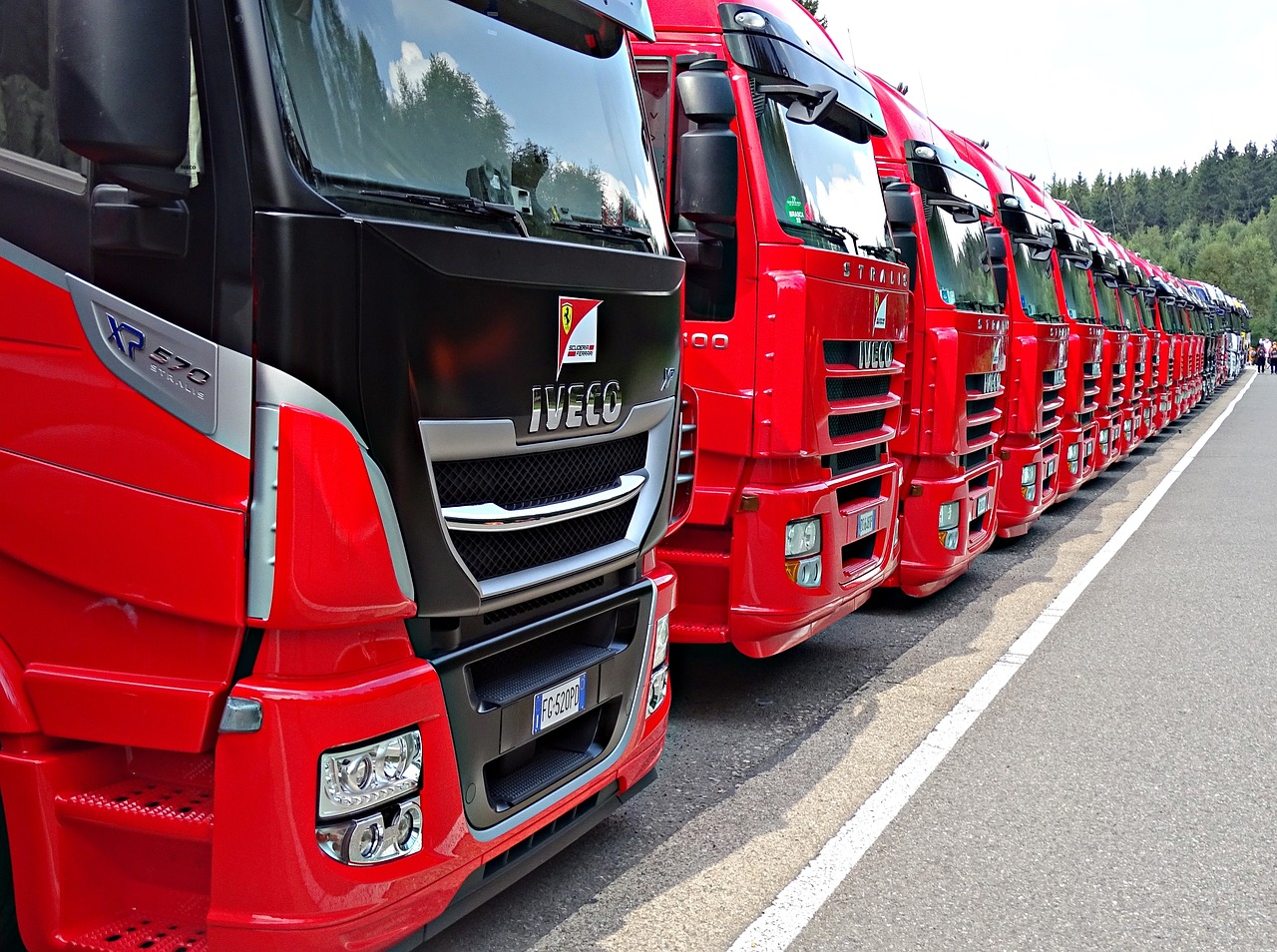Truck driving is a rewarding and essential career, and with the logistics sector booming in Europe, the Netherlands offers excellent opportunities for drivers from around the world.
If you’re considering applying for truck driver jobs in the Netherlands in 2025, you’re likely to find numerous opportunities due to the country’s strategic position in European transport and its well-developed infrastructure.
However, before jumping into the application process, there are several key steps you need to follow to ensure that you meet the necessary qualifications and stand out in the competitive job market.
Advertisements

In this post, we will explain everything you need to know and explore nine steps to successfully apply for truck driver jobs in the Netherlands in 2025.
Truck Driver Jobs in the Netherlands in 2025
The following steps outline an easy route to securing your dream job in the Netherlands:
1. Understand the Truck Driving Industry in the Netherlands
The Netherlands has one of the most advanced transportation networks in Europe. The country’s central location, well-maintained roads, and strong trade relationships with neighbouring countries make it a logistics and freight transportation hub. In 2025, the Dutch economy continues to rely heavily on goods transportation, with a significant demand for truck drivers in various sectors, including freight forwarding, logistics companies, and distribution networks.
Understanding the local industry’s structure and demand is crucial. The trucking industry in the Netherlands is highly regulated, with strict laws to ensure safety, environmental standards, and driver well-being. Familiarize yourself with these aspects, impacting your job search and application.
Read Also: How to Apply for Tailoring Jobs in USA with Visa Sponsorship
2. Ensure You Meet the Basic Requirements
Before you start applying for truck driver positions, it’s essential to ensure that you meet the basic qualifications and legal requirements to work in the Netherlands as a truck driver. These include:
- Valid Driver’s License: In most cases, you’ll need a European Union (EU) or European Economic Area (EEA) driver’s license. If you’re from a non-EU country, you may need to exchange your foreign license for a Dutch one or pass additional exams. A CE driving license is often required for larger trucks and heavy goods vehicles.
- Driving Experience: Employers typically require candidates to have at least one to two years of truck driving experience. This is especially important if you apply for specialized roles like long-haul or transportation for dangerous goods. Work experience with various truck types, such as a reach truck, may be advantageous in some positions.
- CPC (Certificate of Professional Competence): The Dutch authorities require commercial truck drivers to have a valid CPC, which ensures that drivers are adequately trained in road safety, vehicle operation, and other essential skills.
- Medical Fitness: Truck driving can be physically demanding, so you must pass a medical examination to prove you can drive. This includes vision tests, hearing tests, and an overall health check.
- Language Proficiency: While many Dutch companies operate in English, speaking Dutch is an asset and may be a requirement for certain positions, especially those involving direct interaction with clients or team members. Being proficient in English is often sufficient for more extensive international companies.
3. Get Familiar with Dutch Transport Regulations
Like all EU countries, the Netherlands follows strict working hours, rest periods, and cargo handling regulations. The EU Drivers’ Hours Regulation outlines the legal limits on driving times and rest periods to ensure the safety and well-being of drivers.
As a truck driver in the Netherlands, you’ll need to adhere to:
- Daily Driving Time: You can drive up to 9 hours daily, but only for a maximum of 56 hours a week.
- Rest Periods: Drivers must take a daily rest of 11 hours (which can be reduced to 9 hours, no more than three times a week). After driving for four and a half hours, you must take a break of at least 45 minutes.
- Tachograph: Trucks in the Netherlands have tachographs that record driving time, speed, and rest periods. Drivers must comply with these regulations to avoid fines.
Familiarizing yourself with these regulations is essential, as adhering to them is a legal obligation and a key part of your responsibilities as a truck driver.
4. Prepare Your CV and Cover Letter
When applying for truck driving jobs, your CV and cover letter are your first chance to make a good impression. Dutch employers appreciate precise, concise, and well-organized applications. Here are some tips for crafting your CV and cover letter:
- Tailor Your CV: Highlight your relevant driving experience, certifications (such as the CPC), and the types of vehicles you’ve driven. Be specific about your experience with different kinds of cargo, whether you’re skilled in long-haul, short-haul, or specialized freight, and any other relevant skills (such as knowledge of specific geographic areas or languages). If you’ve operated different truck types or driven national routes across Europe, mention that, too.
- Focus on Safety: Dutch employers place a high value on safety. Ensure your CV emphasizes your commitment to safe driving practices, adherence to regulations, and the proper handling of goods. Demonstrating your knowledge of road safety and working in compliance with EU transport regulations will be vital.
- Be Professional in Your Cover Letter: The cover letter should introduce yourself professionally, explaining why you’re interested in the role and what you can bring to the company. Make it clear that you understand the industry and the job description.
5. Search for Job Opportunities
The best place to start your job search is browsing various job portals and recruitment websites. Some of the most popular sites for truck driver jobs in the Netherlands include:
- Indeed Netherlands: This global job board is one of the most comprehensive platforms for job seekers, with various driver jobs listed regularly.
- LinkedIn: LinkedIn is an excellent tool for networking and finding job listings in the Netherlands. Many logistics companies post job openings directly on the platform.
- Glassdoor: Glassdoor allows you to search for truck driving jobs and read company reviews to understand the work culture better.
- Transport and Logistics Agencies: Many staffing agencies specialize in logistics and transportation, and they can help match you with the right job. Examples of these agencies include Randstad, Manpower, and YER.
Additionally, remember to check the websites of central Dutch logistics and transport companies such as PostNL, DB Schenker, and Kuehne + Nagel. These large corporations often have dedicated job boards and offer competitive salaries and benefits.
6. Understand the Salary Expectations
Truck drivers in the Netherlands typically earn competitive wages, with salaries ranging from €2,000 to €3,500 per month, depending on experience, the type of job, and the region. For example, long-haul drivers or those with specialized skills (such as transporting hazardous goods) can expect to earn higher wages. The average salary will vary depending on your experience and job offer.
Many Dutch employers offer benefits like paid holidays, health insurance, pensions, and base salaries. Some positions provide additional perks like travel allowances, overtime, and modern corporate clothing. Researching and comparing salary expectations when applying to different companies is essential to ensure that the role meets your financial needs.
7. Prepare for the Interview
Once you’ve submitted your applications and received interview invitations, it’s time to prepare for the interview process. Dutch employers generally prefer candidates who are punctual, professional, and well-prepared. Here’s how to get ready:
- Research the Company: Take the time to research the company, its fleet, and its logistics network. This will help you answer questions about why you want to work for them and how your experience can benefit their operations.
- Demonstrate Knowledge of Regulations: Be prepared to discuss your understanding of driving regulations, safety practices, and how you ensure compliance with the law. This is especially important if the company works on national routes or handles specialized freight that requires additional certifications.
- Ask Questions: Interviews are a two-way street, so be sure to ask about the company’s work culture, training programs, and any additional benefits offered.
- Driver Test: Some companies may require a practical driving test. Be sure to brush up on your driving skills and familiarize yourself with the type of truck you’ll be driving. You might be required to demonstrate proficiency in handling roll containers, overtime, or working in shifts.
8. Consider Relocation Assistance and Work Permits
You may need to secure a work permit or residency visa if you’re from outside the Netherlands. EU/EEA nationals can work freely in the Netherlands, but non-EU nationals must check the specific work visa requirements.
Additionally, some companies may offer relocation assistance, especially for skilled drivers in high-demand areas. It’s worth asking about this during the Interview to see if any financial or logistical support is available.
9. Adapt to Dutch Work Culture
The Netherlands’ unique work culture emphasizes work-life balance, punctuality, and efficiency. Dutch employers generally appreciate direct communication, so be prepared to converse openly and straightforwardly with your colleagues and supervisors.
Moreover, understanding the Dutch emphasis on sustainability in transportation will be important in 2025, as the logistics industry is increasingly adopting eco-friendly practices. Familiarize yourself with initiatives to reduce carbon emissions and energy consumption within the transport sector.
Conclusion
Applying for truck driver jobs in the Netherlands in 2025 can be a fulfilling career move, but it requires careful planning, understanding of local regulations, and preparation. By ensuring that you meet the qualifications, tailoring your application materials, and researching potential employers, you can increase your chances of landing a truck driver position that suits your experience and career goals. The trucking industry in the Netherlands continues to grow, and skilled drivers are in high demand, so with the right approach, you can successfully navigate the job application process and secure a rewarding job in one of Europe’s most dynamic transport markets.
FAQs
How do I become a truck driver in the Netherlands?
Here are the steps to become a truck driver in the Netherlands:
- Obtain a Valid Driver’s License
- Get a B-category license (for smaller vehicles).
- Obtain a CE driving license (for large trucks and heavy goods vehicles).
- Complete the Certificate of Professional Competence (CPC)
- Attend training and pass exams focused on road safety and vehicle operation.
- Pass a Medical Examination
- Complete a medical check that includes vision, hearing, and overall health assessments.
- Gain Practical Experience
- Gain 1-2 years of driving experience through entry-level jobs or apprenticeships.
- Familiarize Yourself with Dutch Transport Regulations
- Learn about EU Drivers’ Hours Regulations, rest requirements, and tachograph usage.
- Search for Job Opportunities
- Look for truck driving jobs on job boards, recruitment agencies, and company websites.
- Prepare Your CV and Cover Letter
- Tailor your CV to highlight relevant driving experience and certifications.
- Prepare for Interviews and Driver Tests
- Be ready to answer questions about your experience and knowledge of regulations.
- Complete any required practical driving tests.
- Understand the Dutch Work Culture
- Familiarize yourself with work-life balance expectations, salary ranges, and benefits.
- Start Working as a Truck Driver
- Once hired, begin your career by adhering to safety regulations and contributing to the company’s success.
Are truck drivers in demand in the Netherlands?
Yes, truck drivers are in high demand in the Netherlands. The country plays a key role in European logistics, with a well-developed transportation network supporting domestic and international trade. Several factors drive the demand for truck drivers:
Strong Logistics and Transportation Industry: The Netherlands is a central hub for trade and logistics in Europe, with major ports like Rotterdam and an extensive network of highways. This results in continuous transportation of goods within the country and across Europe, increasing the need for truck drivers.
Aging Workforce: Many truck drivers in the Netherlands are approaching retirement, creating a gap that needs to be filled by younger workers. As a result, companies are actively seeking qualified drivers to replace retiring employees.
E-commerce Growth: The rise in online shopping has led to increased demand for distribution and delivery services, which require more drivers to transport goods to consumers.
Specialized Roles: There is also a demand for drivers with specialized skills, such as those who can transport hazardous materials or refrigerated goods. These positions can offer higher pay and more job opportunities.
European and International Transport: Given the Netherlands’ geographical location, many companies require drivers for cross-border transport, creating more opportunities for long-haul drivers.
Truck driving in the Netherlands offers strong job prospects, especially for those with the right qualifications and experience.
Advertisements

